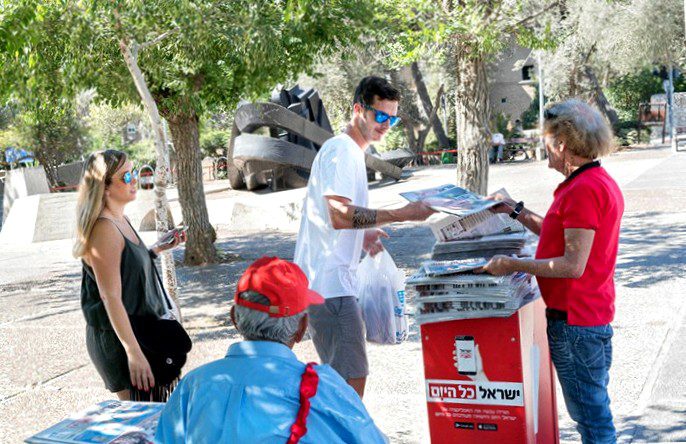A super-rich U.S. man is funding an Israeli newspaper that its critics say represents the interests of one person above all others: Israel's prime minister
It is interference in Israel's "internal affairs" when other countries donate to Israeli non-governmental organizations; it must be disclosed and, better yet, limited. At least that's what Benjamin Netanyahu, the country's prime minister, thinks, and is calling for tougher laws. When it comes to financial support from private individuals, he doesn't see it so closely.
For example, there's entrepreneur Sheldon Adelson, a Jewish U.S. citizen who is married to an Israeli woman and has 20. Ranked in the "Forbes" world ranking of the richest people. Not only does he have a fortune estimated at $30.4 billion, he also apparently has a thing for Netanyahu's political course. In 2007, Sheldon Adelson launched a new free daily newspaper, "Israel HaYom" ("Israel Today"), financed from his private purse and with a pro-Netanyahu political slant, in order to set a conservative tone in Israel's media landscape.
The Israeli media watchdog "The 7th Eye" speaks of "clear bias" in favor of Netanyahu, which can be seen every day on the pages of that newspaper, which has earned it the nickname "Bibi Newspaper" – after the nickname of the prime minister himself. The liberal "Haaretz" did not even like to talk about journalism and headlined: "'Israel HaYom' is not a newspaper" – it is rather a propaganda organ. Naftali Bennett, acting education minister in Netanyahu's cabinet and potentially a future prime minister himself in the eyes of many Israelis, put it this way in 2014: "'Israel HaYom' is one man's mouthpiece."
Free and available almost everywhere: the newspaper makes it easy for its readers
The chorus of critics has probably become so loud and many-voiced because "Israel HaYom" has become the most widely read newspaper in the country within a few years. With a print circulation that, according to "Israel HaYom," stands at 275.000 copies per working day (in the 2015 election campaign, there were twice as many) and 400.000 for the weekend edition, the free paper is a force in the Israeli print market.
The newspaper offers its audience comprehensive coverage and employs good journalists. This success is probably due in no small part to the fact that the newspaper makes it easy for its readers: "Israel HaYom" is available in busy public places and is handed to motorists through the window at traffic lights. This may turn non-Netanyahu supporters into readers as well.
Is the newspaper therefore a danger to democracy?? In the Knesset, parliamentarians discussed a bill in 2014 that would restrict the distribution of free newspapers above a certain size – unspokenly, it was about "Israel HaYom". Politicians from Netanyahu's cabinet also voted in favor in the first reading. However, the final vote on the law did not take place, because in the meantime the Knesset was dissolved. Reason was the dismissal of two ministers in the context of the discussion about the Israeli citizenship law.
Israel Hayon

Costs nothing: "Israel HaYom" is distributed free of charge
The following year, lawyer Shahar Ben-Meir filed a petition with the Supreme Court. "Israel HaYom" was a "propaganda platform disguised as a newspaper," he wrote, a "substantial, tangible and immediate danger to a democracy based on the principle of equality". Its sole purpose, it said, is "ongoing election propaganda for the candidate [Netanyahu] that lasts the whole year, every year". But the judges dismissed the petition for lack of evidence: "Israel HaYom" is not an illegal election campaign tool. What Sheldon Adelson invests in the newspaper does not count as a donation to Netanyahu either.
For Tehilla Shwartz Altshuler, director of the Media Reform Program at the Israel Democracy Institute, the problem lies elsewhere anyway: "Israel HaYom" is endangering the country's other print media and thus diversity of opinion. Because the free newspaper has not only snatched readers away from the competition, but also advertising customers. "Israel HaYom' sells its ads for much less than the other newspapers," says Shwartz Altshuler, who is also a board member of the National Press Council. "This has led to heavy losses for competitors."
Israel HaYom in the red: $190 million loss in seven years
Not all media have financial backers with deep pockets like Sheldon Adelson, who is accused of many things in the case of "Israel HaYom", except one: profiteering. The publication has always made losses, according to reports in the newspaper "Haaretz" these were 190 million US dollars between 2007 and 2014.
Israel Hayon

Many Israelis get their news only from the Internet or television – if newspaper, why pay for it?
Officially, the desire is to give Israel a "fair and balanced view of the news," but his critics are convinced that Adelson has other goals with this losing business: The Zionist is an avowed opponent of the two-state solution – and this interest seems to him to be in good hands with Netanyahu.
As for the propaganda accusation, the newspaper said that she simply had a similar ideology to Netanyahu's, but that there was nothing wrong with that and that it did not prove that they were otherwise connected. Moreover, before the newspaper was founded, there would have been an imbalance, Israel's media would have been controlled by two major newspapers, which themselves spread very specific ideologies.
Gisela Dachs, a social scientist and journalist in Tel Aviv, also considers the label "propaganda" to be exaggerated: "I would not say that 'Israel HaYom' is a newspaper in which Netanyahu is praised to the skies from morning to night. It is rather the absence of criticism of Netanyahu that is problematic." Only undue influence? This is "really nonsense", even if Netanyahu is certainly not harmed by the success of the newspaper. However, too little is ultimately known about the newspaper's actual readership and impact, he said.
Israel Hayon

This may be how the newspaper reaches people who have a very different political viewpoint
"What we call it is not the problem, it is the relationship Netanyahu has with Israeli media," says Shwartz Altshuler. The prime minister has been using his social media channels to come down hard on disagreeable media for some time now. Given the Netanyahu bashing and the sometimes level-less coverage of his wife, not entirely unjustly, she thinks. However, he is overshooting the mark: Netanyahu, who incidentally was head of government and minister of communications in one person between 2014 and 2017, is attempting to gain far-reaching control over Israeli public broadcasting.
Netanyahu and the media: it's complicated
Earlier this year, audio recordings leaked to the press showing that Netanyahu met several times in 2014 with the publisher of Israel's second largest newspaper, Yedioth Ahronoth. The deal at stake, according to Channel 2 TV reports : friendlier coverage in exchange for a lower "Israel HaYom" charge. The authorities are currently investigating whether the two men can be proven to have engaged in bribery or corruption. Sheldon Adelson and his wife Miriam have already been questioned – but as witnesses, not as suspects.
Meanwhile, "Israel HaYom" in the weekend edition of 16. June put Education Minister and Netanyahu rival Naftali Bennett on the front page with a recent legislative initiative. What seemed unthinkable for a long time confirms a trend for media observers: "Israel HaYom" now reports in a somewhat more balanced way. Admittedly, it is not a 180-degree turn: Bennett, chairman of the Jewish Home party, stands for the interests of the settlers and against a Palestinian state.